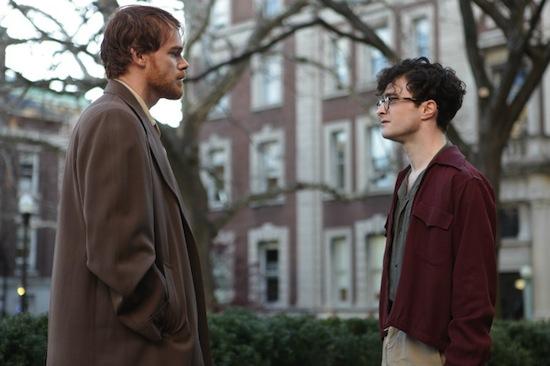Michael C. Hall on depicting the hedonistic Beats before they became literary icons in ‘Kill Your Darlings’
Auteur: Michael-Oliver Harding
From the James Franco-starring Howl to Walter Salles’ On The Road, filmmakers of late have proven eager to revisit the halcyon days of a countercultural movement, whose literary ripples are still being felt some 60 years later. But far from rehashing Kerouac and Ginsberg’s free-spirited emancipation, Kill Your Darlings writer-director John Krokidas trains his lens on a little known but pivotal event in the genesis of the Beats: the murder of David Kammerer, an English teacher and childhood friend of William S. Burroughs who some now regard as the father of the Beats (and who’s portrayed here by Michael C. Hall, with all the nuance, colour and dimension we’ve come to expect from him.)
While most Beat admirers know that Allen Ginsberg (Daniel Radcliffe), Jack Kerouac (Jack Huston) and Burroughs (Ben Foster) first crossed paths – and experienced their vividly rendered social and sexual awakenings – in bohemian circles of ‘40s New York, few are familiar with Lucien Carr (Dane DeHaan), a magnetic, reckless, and naturally gifted Ivy League pupil who charmed the pants off everyone, not the least of which being Kammerer. Unfortunately, the latter’s troubling infatuation for Carr sealed his tragic fate, with Carr eventually killing him in Riverside Park (no spoiler here, guys, as the film opens on this scene.) Nightlife.ca caught up with a reflective, soft-spoken Michael C. Hall at this fall’s Toronto International Film Festival (a few weeks prior to Dexter’s much-maligned series finale, so don’t expect him to weigh in on that here!) about how Kammerer’s murder created the circumstances surrounding the then-nascent Beat Generation. Because, as Hall pointedly reminded me, “to suggest that if Kammerer hadn’t been murdered, On The Road wouldn’t have been written is maybe a stretch… But not that much of a stretch.” Here are five things we took away from our conversation with Hall:
1. Prior to getting involved with the project, Hall was already a well-read Beat aficionado.
“I had read Kerouac, Ginsberg, Burroughs, some Gregory Corso, Herbert Huncke. I definitely went through a period where I was more intensely investigating the Beats, in my twenties, and I was aware of this story. I met Ginsberg on a couple of occasions in the early ‘90s. When The Alienist by Caleb Carr, Lucien Carr’s son, came out, I remember talking about it with someone who mentioned his awareness of the murder at Riverside Park, and I was fascinated both by the story itself and amazed that I had never heard about it before.”
2. In fleshing out his portrayal of Kammerer, Hall researched as much as he could, but a lot of the blanks were left to be filled in.
“There was a desire on the part of everyone involved [with Kill Your Darlings] to portray him as more than a footnote predator. All that was true (him latching onto Lucien) but his motivations were not, at least, self-consciously sinister. I think he was lovesick, for lack of a better term, and couldn’t get over it. Certainly he was manipulative in his ways, but I wanted to have his need be a human one, not a monstrous one. Arguably an inappropriate one, but not one that was about being a villain.”
3. Besides the Beats’ writings, teenaged Hall was drawn to J. D. Salinger and Bob Dylan, as their musings offered a mirror to his own adolescent alienation.
“I most gravitated towards music that had come before my high school years, from Black Sabbath to Bob Dylan. As a preteen, I was really taken with the pulp-y, young adult novels of S.E. Hinton (The Outsiders). All of J.D. Salinger’s books, not just The Catcher in the Rye, were also some of my favourites and remain so, as they definitely capture a sense of adolescent longing, angst and restlessness. It’s always nice when an account of alienation allows you to feel less alone.”
4. After starring in two of the most important serialized dramas of the new millennium (often mentioned in conversations about “the second golden age of television”), Hall hopes to mix it up a bit.
“I think there’s a lot of exciting stuff happening on the television front. I’m not going to be so unwise as to say that I will never do another television series… (laughs) [Ed's Note: which he famously said after Six Feet Under wrapped] But what I am interested in doing is getting back on stage, certainly doing more films, more projects that have a definitive beginning, middle and end (laughs) – not these open-ended commitments to characters, which have been both very challenging and rewarding. At this point, I’m interested in mixing it up a bit.”
5. The iconic characters he’s given life to (on Six Feet Under, on Dexter, even in Kill Your Darlings) explore darker facets of human nature. And it’s not happenstance that Hall gravitates towards these meaty parts.
“I can’t say that it’s purely coincidental. As a person, I have a capacity for humour and silliness that perhaps hasn’t been exploited in my work (laughs), but I can’t deny it: I think issues of life and death, obsession, darker manifestations of human nature, fathers and sons…fundamental relationships of that sort appeal to me.
I really do relish the challenge of bringing some sympathy or humanity to a character that might otherwise remain characterized in a less than three-dimensional way. That’s probably part of the appetite and appeal for me. When people ask: ‘is David Kammerer a victim or a villain?’ Well, yeah, exactly! I like that ambiguity, those grey areas.”
Kill Your Darlings
Now in theatres











